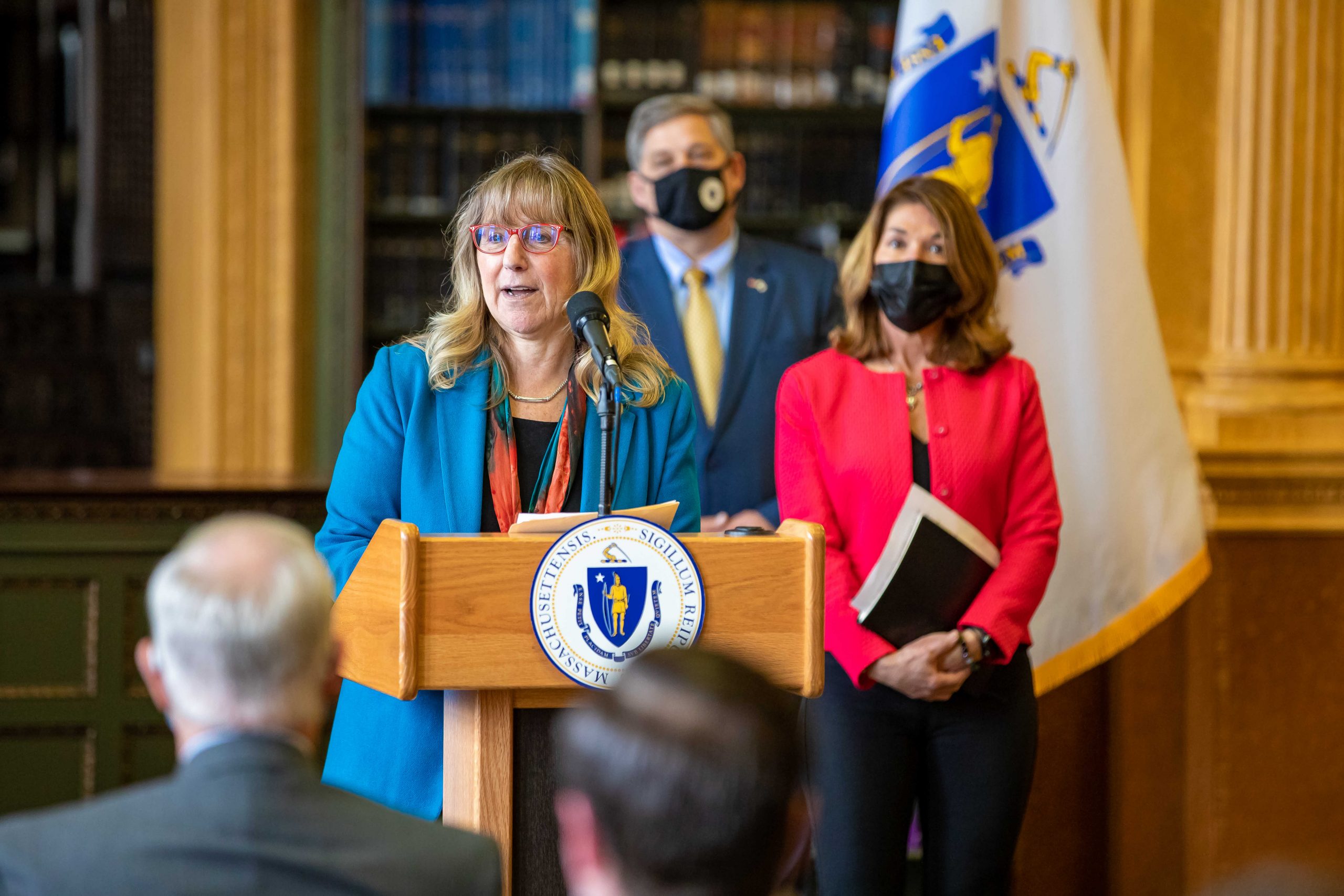In full transparency, the following is a press release from the Senate President’s office submitted to SOURCE media. (stock photo)
***
[broadstreet zone=”54526″]
BOSTON – The Massachusetts State Legislature on Friday unanimously passed a $48.07 billion budget for Fiscal Year 2022 (FY22). This budget maintains fiscal responsibility, does not cut services, and makes targeted investments to address emerging needs, safeguard the health and wellness of the most vulnerable populations and ensure residents will benefit equitably as the state recovers from the impacts of the COVID-19 pandemic.
“With this budget, we can continue our work of getting back to better with a focus on increasing resources for services that are critical to everyday life in the Commonwealth,” stated Senate President Karen E. Spilka (D-Ashland). “This compromise proposal, which does not draw from our rainy day fund, helps prepare us for the road ahead by investing in mental and behavioral health services, Family Resource Centers, early education and care, K-12, and more, along with providing additional supports for vulnerable families. I want to thank my partner, House Speaker Mariano, as well as Senator Rodrigues, Representative Michlewitz, the members and staff of Ways and Means as well as my colleagues and their staffs for their collaboration in advancing this proposal.”
Having been passed by the House and Senate, the legislation now goes to Governor Baker for his signature.
[broadstreet zone=”59945″]
“As we recover from uncertain times during the COVID-19 pandemic, the Legislature is proud to deliver a budget that thoughtfully grows the Massachusetts economy, spurs job training and employment opportunities, expands services and programs, and invests in our long-term priorities, such as growing our Stabilization Fund and implementing the Student Opportunity Act,” said Speaker of the House Ronald J. Mariano (D-Quincy). “I am proud of my House colleagues and would like to thank Chair Michlewitz, Vice Chair Ferrante and Assistant Vice Chair Donato for their diligent work during this process. I would also like to thank Senate President Spilka and her colleagues in the Senate for their hard work and collaboration.”
Taking into consideration strong tax revenue performance in Fiscal Year 2021 (FY 2021), the final FY22 conference report increases revenue assumptions by $4.2 billion over the December consensus revenue projection for a new tax revenue projection of $34.35 billion. The FY22 budget does not make a withdrawal and instead transfers funds into the Stabilization Fund, projecting an estimated balance of approximately $5.8 billion for this crucial ‘rainy day’ fund at the end of the fiscal year.
Notably, the Legislature provides substantial funds in the FY22 budget to invest in the Commonwealth’s long-term obligations. Prioritizing funding for education, the new Student Opportunity Act Investment fund was funded at $350 million to be utilized in the coming years for the implementation of the state’s landmark Student Opportunity Act (SOA). Additionally, a supplemental payment of $250 million was transferred to the Pension Liability Fund to reduce the Commonwealth’s pension liability.
[broadstreet zone=”59946″]
“Built upon a resilient and steadily improving economy, the FY 2022 Conference Committee Report is a forward-looking, fiscally responsible plan that doubles down on our commitment to an equitable recovery; bolsters our Rainy Day fund, ensuring healthy reserves for years to come, and more importantly, leaves our Commonwealth in a much stronger fiscal position than before the COVID-19 pandemic,” said Senator Michael J. Rodrigues (D-Westport), Chair of the Senate Committee on Ways and Means. “Thank you to Senate President Spilka for her continued leadership and support, Senators Friedman and O’Connor for their invaluable contributions on the Conference Committee, Chairman Michlewitz and the House conferees for their partnership, and to all of my colleagues for their advocacy and input throughout this budget process. Because of our collective work together, we have charted a hopeful path forward by investing to expand educational opportunity, safeguard the health and wellness of our most vulnerable, support our children and families, strengthen local public health efforts, meet the workforce needs of our post-pandemic economy, and so much more. I look forward to the Governor signing this budget.”
“As we vote on the final FY2022 budget, we mark a capstone to a volatile 16-month odyssey we have seen since the pandemic first struck the Commonwealth, but thankfully this roller coaster is letting us exit off today at a peak and not a valley. We have come out of the last year and a half in a stronger fiscal situation than anyone could have ever imagined. For us to be in this favorable of a situation is a testament to the fortitude and resolve of the Legislature,” said Representative Aaron Michlewitz, Chair of the House Committee on Ways & Means (D-Boston). “The investments made in this budget will go a long way to improve the economic outlook for the Commonwealth in an efficient and equitable manner.”
As a cornerstone of the Commonwealth’s equitable recovery, the FY22 budget protects access to educational opportunity and charts a path forward for students, families, educators, and institutions. The budget maintains the Legislature’s commitment to implementing the Student Opportunity Act by FY 2027. The conference report proposal fully funds the first year of the SOA consistent with the $5.503 billion local aid agreement reached in March, amounting to an increase of $220 million over FY21.
Despite the uncertainty created by the pandemic, this increased level of investment represents a 1/6th implementation of SOA rates and ensures that school districts across the Commonwealth have adequate and equitable resources to provide high quality educational opportunities for all students. The FY22 budget also includes a $40 million reserve consistent with the March local aid agreement to provide additional aid to districts experiencing increases in student enrollment compared to October 2020.
[broadstreet zone=”59983″]
The budget invests in higher education allocating $571 million for the University of Massachusetts system, $315 million for community colleges, and $291 million for state universities. The budget also includes $130 million in scholarship funding and funds the community colleges SUCCESS Fund at $10.5 million and the STEM Starter Academy at $4.75 million.
The budget also includes large investments in labor and economic development, such as the creation of a trust fund dedicated to job training for the offshore wind industry to be administered by the Massachusetts Clean Energy Center. This budget makes an initial deposit into this fund of $13 million to establish and grow technical training programs in our public higher education system and vocational-technical institutions. The fund will also prioritize grants and scholarships to adult learning providers, labor organizations, and public educational institutions to provide workers with greater access to these trainings.

Other education investments include:
- $388.4 million for the Special Education Circuit Breaker, reimbursing school districts for the high cost of educating students with disabilities at the statutorily required 75% reimbursement rate
- $154.6 million for reimbursing school districts at 75% for costs incurred when students leave to attend charter schools
- $82.2 million for regional school transportation
- $50 million for Adult Basic Education
- $27.9 million for the Metropolitan Council for Educational Opportunity (METCO) program
- $6 million for Social Emotional Learning Grants to help K-12 schools bolster social emotional learning supports for students, including $1M for a new pilot program to provide mental health screenings for K-12 students
- $4 million for Rural School Aid
“We could not have predicted the onset of the COVID-19 pandemic but over the past 16 months we have done our best to prepare for the future, and I’m proud the FY22 budget continues that work by making robust short- and long-term investments in mental and behavioral health services, education, local health departments, and so much more,” said Senator Cindy F. Friedman (D-Arlington), Vice Chair of the Senate Committee on Ways and Means and member of the FY22 Budget Conference Committee. “I sincerely thank Senate President Spilka, Ways and Means Chair Rodrigues, and the rest of my colleagues in the Legislature for their work supporting all residents of the Commonwealth, especially those most in need.”
“Today’s passage of the FY 22 Budget is a reflection of sound and prudent decisions made by the Legislature to move the Commonwealth’s economy forward,” said Representative Ann-Margaret Ferrante, Vice Chair of House Ways & Means (D-Gloucester). “This year’s budget continues in that tradition by investing, protecting and growing jobs in our film industry, depositing funds into the Stabilization Fund and Accelerating Payments into the Pension Fund, all while protecting our most vulnerable by increasing the Commonwealth’s investment in mental health and the student opportunity act. I want to congratulate Speaker Mariano and Chair Michlewitz for a job well done.”
[broadstreet zone=”59984″]
This budget supports working families by addressing the increasing costs of caregiving for low-income families by converting the existing tax deductions for young children, elderly or disabled dependents and business-related dependent care expenses into refundable tax credits. These tax credits will benefit low-income families who have little or no personal income tax liability and cannot claim the full value of the existing deductions. The conversion to a refundable tax credit would provide an additional $16 million to over 85,000 families each year. Coupled with the expanded Child Tax Credit and the Child and Dependent Care tax credits under the federal American Rescue Plan Act, these credits will help lift families out of poverty and support low-income working parents and caregivers across the Commonwealth.
The FY22 budget builds on the success of last year’s efforts to tackle ‘deep poverty’ with a 20 per cent increase to Transitional Aid to Families with Dependent Children (TAFDC) and Emergency Aid to the Elderly, Disabled and Children (EAEDC) benefits over December 2020 levels, ensuring families receive the economic supports they need to live, work and provide stability for their children. Further, the final budget repeals the asset limit for Transitional Aid to Families with Dependent Children. Traditionally, asset limits on assistance programs further expose those who are already financially vulnerable to greater economic hardship. While families are recovering from the impacts of COVID-19, it is vital to make assistance programs accessible and effective, and removing the asset limit allows families to save for education, job training, reliable transportation, home expenses, and other emergency needs.
[broadstreet zone=”59947″]
Other children and family investments include:
- $30.5 million for Emergency Food Assistance to ensure that citizens in need can navigate the historic levels of food insecurity caused by COVID-19
- $7.5 million for grants to our Community Foundations to support communities disproportionately impacted by the pandemic
- $5 million for the Secure Jobs Connect program, providing job placement resources and assistance for homeless individuals
- $4.2 million for the Office of the Child Advocate, including $1M for the establishment and operation of a state center on child wellness and trauma
- $2.5 million for Children Advocacy Centers
To help families get back to work, the FY22 conference report includes $820 million for the early education sector, including $20 million to increase rates for early education providers, $15 million for Massachusetts Head Start programs, $10 million for the Commonwealth Preschool Partnership Initiative to expand public preschool, and $9 million to cover the cost of fees for parents receiving subsidized early education in calendar year 2021.
The FY22 budget provides resources to help with housing stability, including $150 million for the Massachusetts Rental Voucher Program to expand access to affordable housing, $85 million for grants to local housing authorities, $22M for the Residential Assistance for Families in Transition Program and $8 million for Housing Consumer Education Centers to help administer nearly $1 billion in federal housing relief.
“This budget represents an essential step forward as our Commonwealth looks ahead to recovering from the pandemic and rebuilding a strong and equitable economy for Massachusetts families, businesses and communities,” said Senator Jason Lewis, Assistant Vice Chair of the Senate Committee on Ways and Means and Senate Chair of the Joint Committee on Education. “I’m especially proud that this budget invests substantially in Massachusetts K-12 public schools and in early education and child care, which form a key pillar of economic opportunity for millions of working parents and families across the state.”
[broadstreet zone=”58610″]
“I’d like to say how proud we are to have passed the budget today,” said Representative Paul J. Donato, Assistant Vice Chair of House Ways & Means (D-Medford). “We are growing our rainy day fund as well as the aid of vital state programs, such as the Chapter 70 program which provides financial support to public elementary and secondary schools, as well as funding for transportation, infrastructure and economic development projects. I look forward to seeing the results of this vital funding in the near future.”
The budget makes the state’s film tax credit permanent and requires an increase in the percentage of production expenses or principal photography days in the Commonwealth from 50 per cent to 75 per cent. The film tax credit was set to expire in January 2023. The budget also includes a disability employment tax credit for employers that hire employees with a disability.
To ensure long-term fiscal responsibility, FY22 budget repeals three ineffective tax expenditures as recommended by the Tax Expenditure Review Commission (TERC), namely the exemption of income from the sale of certain patents, the medical device tax credit, and the harbor maintenance tax credit, effective January 1, 2022. The TERC found that these tax expenditures are either obsolete, fail to provide a meaningful incentive, or fail to justify their cost to the Commonwealth. The TERC was created as part of a Senate budget initiative in Fiscal Year 2019.
“While it took some extra time to produce, this budget has been worth the wait,” said House Minority Leader Bradley H. Jones, Jr. (R-North Reading). “We prioritized our spending to address the needs of the Commonwealth, investing in our long-term obligations while also building our reserves to historic highs to mitigate future revenue shortfalls. The budget balances present day needs and future obligations, whether they be educational funding or the pension obligations we face down the road. The budget also takes an important step forward in addressing the rights of sexual assault survivors by requiring all previously untested investigatory evidence kits to be tested within 180 days, building on the important reforms we enacted three years ago to assist survivors.”

“Traveling the road to a state budget for Fiscal Year 2022 has been an odyssey filled with challenge and uncertainty, but by working together we have arrived at a spending document free of broad-based tax increases and stabilization fund withdrawals,” stated Senate Minority Leader Bruce Tarr (R-Gloucester). “Now, with the acceptance of this conference committee report, we are on a path to support important priorities like education, regional school transportation, public health, and support for our cities and towns, while boosting out stabilization fund and other reserves to provide stability and continuity for the future”
“The investments we are making throughout the Commonwealth move us closer to our goal of ensuring no one gets left behind in our recovery efforts,” said Senator Patrick O’Connor (R-Weymouth). “By investing in education, infrastructure, public health, housing, and more, we are investing in the livelihoods of our children, families, seniors, and small businesses. I am proud to have worked alongside my colleagues on the conference committee in a bipartisan fashion to make our state stronger and improve the quality of life for everyone that calls Massachusetts home.”
“This budget reflects a bipartisan collaboration that funds the most important programs in our Commonwealth,” said Representative Todd Smola (R-Warren). “Our commitment to local aid and education continues to be a primary focus and we are adding significant dollars to our stabilization fund, which provides us greater financial security for the future. This budget supports essential services and resources that are critically important given the challenges of the last year.”
The Legislature’s FY22 budget confronts the frontline health care impacts of the pandemic to navigate the challenges posed by COVID-19. It also sustains support for the state’s safety net by funding MassHealth at a total of $18.98 billion, thereby providing over 2 million of the Commonwealth’s children, seniors, and low-income residents access to comprehensive health care coverage. It also invests $15 million to support local and regional boards of health as they continue to work on the front lines against the ongoing impacts of the COVID-19 pandemic.

Understanding that the pandemic has been a stressor on mental and behavioral health, the FY22 budget invests $175.6 million for substance use disorder and intervention services provided by the Bureau of Substance Addiction Services. It also invests $12.5 million to support a student telebehavioral health pilot, public awareness campaigns, loan forgiveness for mental health clinicians, and initiatives to mitigate emergency department boardings for individuals in need of behavioral health support, as well as $10 million for Programs of Assertive Community Treatment (PACT) grants to provide intensive, community-based behavioral health services for adolescents.
Other health care and public health investments include:
- $98.4 million for children’s mental health services, including $3.9M for the Massachusetts Child Psychiatric Access Program (MCPAP) and MCPAP for Moms to address mental health needs of pregnant and postpartum women
- $25 million for Family Resource Centers (FRCs) to grow and improve the mental health resources and programming available to families
- $56.1 million for domestic violence prevention services
- $40.8 million for early intervention services, to ensure supports are accessible and available to infants and young toddlers with developmental delays and disabilities, including funds to support health equity initiatives
To support economic development, the FY22 budget increases access to high quality and reliable broadband—which is crucial for businesses, students and families—by moving the duties of the Wireless and Broadband Development Division to the Department of Telecommunications, which is working to facilitate access to broadband, and has the institutional ability and knowledge to address broadband access issues. The budget also includes a $17 million transfer to the Workforce Competitiveness Trust fund, $15.4 million for Career Technical Institutes, and $9.5 million for one-stop career centers to support economic recovery.
[broadstreet zone=”59948″]
Other investments in economic and workforce development include:
- $15 million for the Community Empowerment and Reinvestment Grant Program
- $6 million for Regional Economic Development Organizations to support economic growth in all regions of the state
- $2.5 million for the Massachusetts Cybersecurity Innovation Fund, including $1.5 million for new regional security operation centers, which will partner with community colleges and state universities to provide cybersecurity workforce training to students and cybersecurity services to municipalities, non-profits, and small businesses
To protect residents of the Commonwealth, the FY22 budget codifies and expands the existing Governor’s task force on hate crimes to advise on issues relating to hate crimes, ways to prevent hate crimes and how best to support victims of hate crimes. The conference report makes the task force permanent and expands its membership to include members of the Legislature and an appointee from the Attorney General. The conference report also contains a provision that supports immigrants who are victims of criminal activity or human trafficking.
The budget also authorizes funds from the Massachusetts Cybersecurity Innovation Fund to be used for monitoring and detection of threat activity in order to investigate or mitigate cybersecurity incidents. In order to proactively combat threats and attacks, the budget provides funding for a public-private partnership with the goal of engaging educational institutions to jointly expand the training, employment and business development in cyber fields in Massachusetts through a combination of regionalized instruction and business outreach, state-wide shared resources, and real-life simulations for cyber training and business development.


